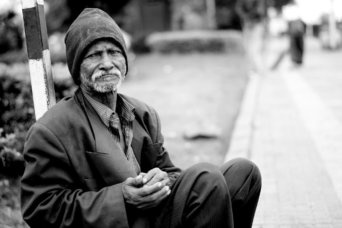- About
- Topics
- Picks
- Audio
- Story
- In-Depth
- Opinion
- News
- Donate
- Signup for our newsletterOur Editors' Best Picks.Send
Read, Debate: Engage.
| topic: | Humanitarian Aid |
|---|---|
| located: | Slovakia |
| editor: | Magdalena Rojo |
A lot of us are feeling anxious about how the economic situation will turn out after the pandemic is over; feelings of uncertainty if our companies will need us or how our businesses will run once things go back to normal. Yet, there are people among us who are living the same stressful moment but without a home to escape to and breathe a bit.
NotaBene is a magazine, a so-called street-paper, that is sold in the streets of Slovakia by people who are homeless. The magazine is run by local NGO Proti prúdu that provides various other services to the homeless population across Slovakia. Half of the magazine price goes to the pocket of the seller, the other half for the organisation.
Each homeless person has a public place designated where he or she can sell the magazine. Thanks to this job, many homeless people are able to pay for their rent, their food, and the medicine they need. Some are even able to take care of their families. The interaction between a person without a home and anybody who buys the magazine is also an important added value of the project.
With Slovakia closing down shops and other places of gathering two weeks ago, the situation for many homeless people selling NotaBene have changed drastically. The editor-in-chief, Sandra Tordová, states that they have observed up to 70 per cent loss in their sales and are under stress because of the uncertain future of the magazine. Many have stopped selling the magazine in order to protect themselves. Eight, similar magazines that work around the world, are currently at a standstill and will not be preparing the upcoming issue.
The novel Coronavirus will highlight the inequalities our societies have created. The homeless are among the most vulnerable groups. Out of those selling NotaBene, two-thirds are older than 50 and many suffer from serious diseases such as diabetes or cardiovascular conditions. Unlike us, they lack access to basic hygienic necessities such as masks and disinfectants.
The organisation Proti prúdu adopted rules as to how sellers can continue their work. They provide information about measures to take to prevent being infected; they started delivering groceries and other basic needs for them. Social workers regularly check on the sellers and provide psychological and financial support.
Proti prúdu has also started a public collection to raise funds – everybody who supports the collection gets a new issue of the magazine in electronic version. The municipality of Slovakia’s capital, Bratislava, and other companies and initiatives provided medical and protective material.
The truth is that protective material is scarce in Slovakia and so are the tests for the Coronavirus at the moment. To date, Slovakia reported 226 positive cases, however the country only tests about 300 to 500 people a day, which means that number is expected to be much higher.
According to Sandra Tordová, the pandemic also points at the lack of hostels and other accommodation facilities for homeless people in Slovakia. What if someone needs to be in quarantine? Proti prúdu asked the ministry of interior to find solutions to this problem. This pandemic is also a test of how well we can protect people at the edge of society. And so far, the irreplaceable role of nongovernmental organizations is obvious. Various municipalities are also acting. But they will need help from the state.
Image: Sri Harsha Gera
